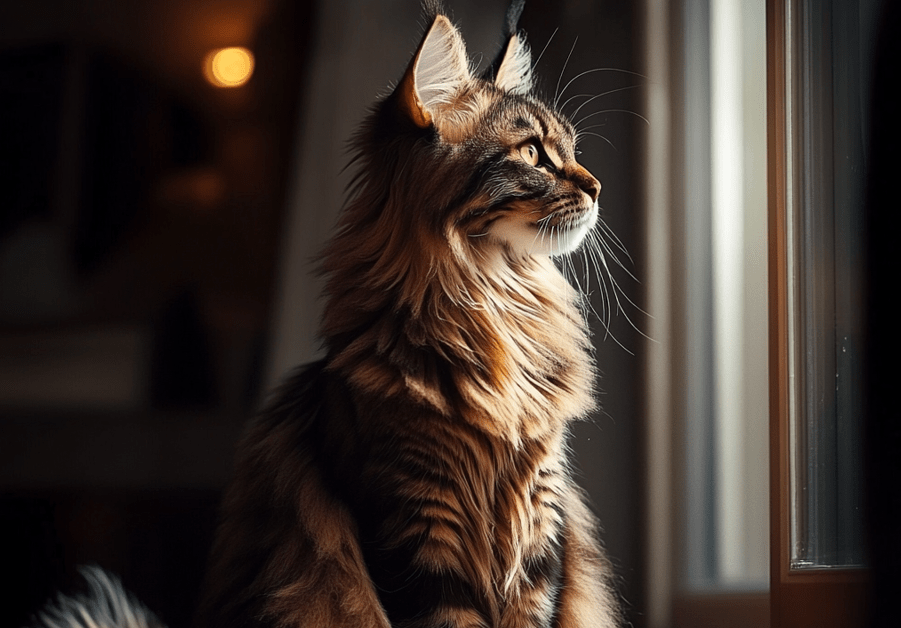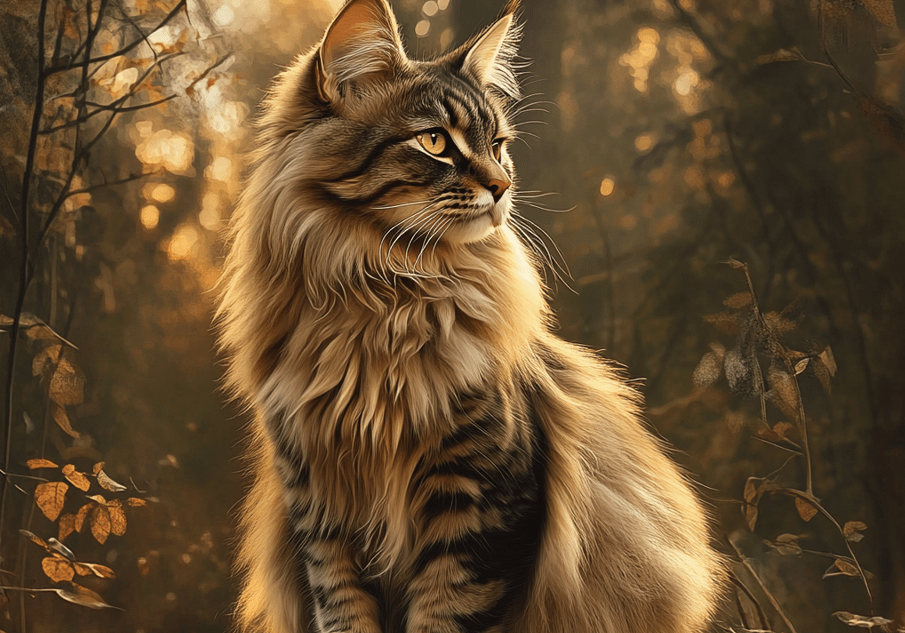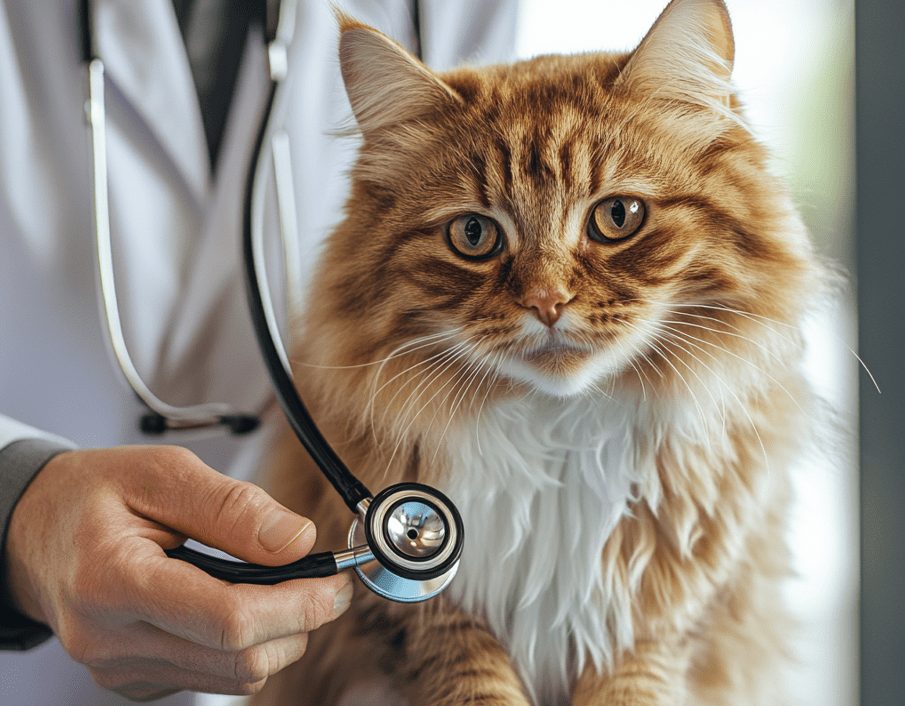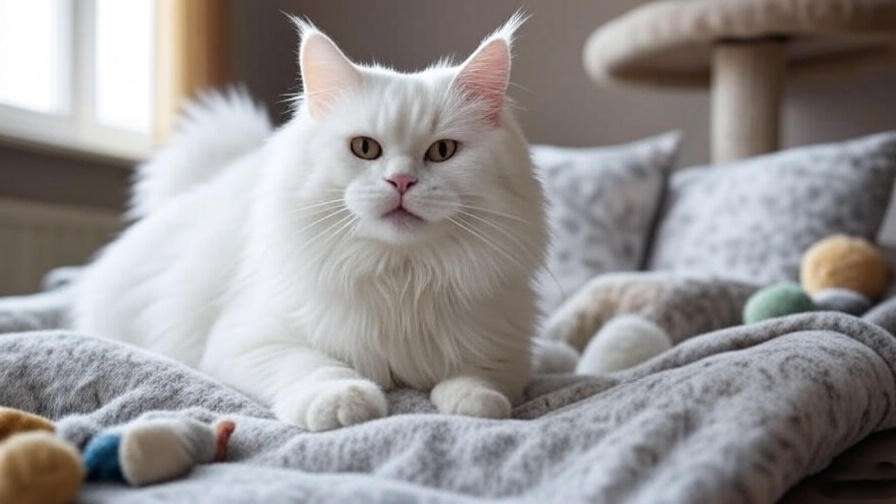
Imagine a majestic white Maine Coon cat gliding through your home, its snowy fur shimmering and its tufted ears perked with curiosity. These gentle giants, known for their dog-like loyalty and playful demeanor, steal hearts effortlessly. But owning a white Maine Coon cat comes with unique responsibilities. Their striking coat and distinct traits demand tailored care to ensure they thrive. Whether you’re a new owner or a seasoned cat enthusiast, this comprehensive guide offers 10 expert-backed tips to keep your white Maine Coon healthy, groomed, and happy. Backed by veterinary insights and breeder expertise, this article addresses every aspect of their care, from nutrition to grooming, ensuring your feline companion lives a vibrant life.
Understanding the White Maine Coon Cat
Unique Characteristics of the Breed
Maine Coons are one of the largest domesticated cat breeds, often weighing 10–25 pounds and boasting a robust, muscular frame. Their friendly, sociable nature earns them the nickname “gentle giants.” The white Maine Coon, a rare and stunning color variant, stands out with its silky, water-repellent coat and expressive eyes—often blue, green, or odd-eyed (one of each). According to the Cat Fanciers’ Association (CFA), the white coat results from a genetic absence of pigmentation, making these cats particularly eye-catching. Their playful intelligence and vocal chirps make them delightful companions, but their size and coat require specialized attention to maintain their health and appearance.
Common Myths and Misconceptions
Many myths surround white Maine Coons, particularly regarding their health. A common misconception is that all white cats are prone to severe health issues. While white Maine Coons with blue eyes may have a higher risk of deafness due to the W gene (as noted in a 2018 study in Veterinary Genetics), not all are affected, and many live healthy lives with proper care. Another myth is that their white fur makes them fragile. In reality, their coat is durable but requires regular grooming to prevent matting and staining. Consulting with feline geneticists and veterinarians helps dispel these myths, ensuring owners focus on evidence-based care.
Tip 1: Prioritize Regular Veterinary Checkups
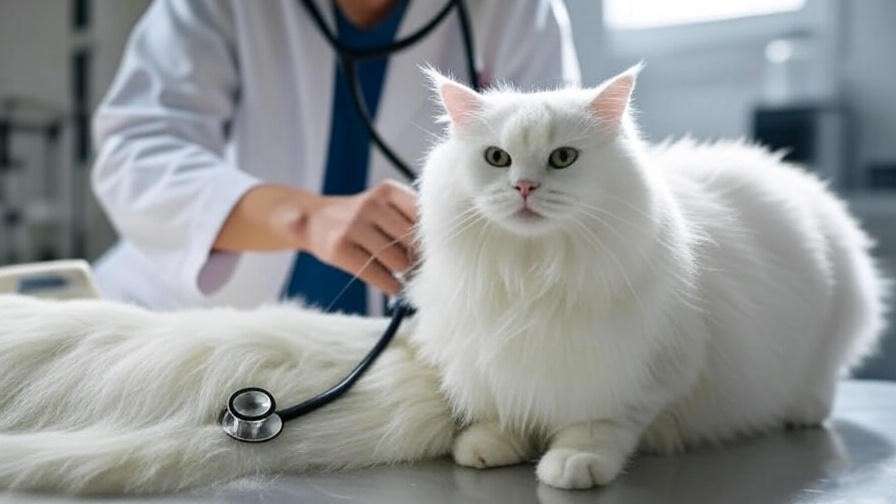
Regular veterinary visits are the cornerstone of a white Maine Coon’s health. Their large size predisposes them to specific conditions, such as hypertrophic cardiomyopathy (HCM), a heart condition affecting up to 10% of Maine Coons, according to a 2020 study in Journal of Feline Medicine and Surgery. White Maine Coons may also face a higher risk of deafness, particularly those with blue eyes, and hip dysplasia due to their robust build. Dr. Sarah Thompson, a feline veterinarian with 15 years of experience, recommends biannual checkups to catch issues early. Monitor for symptoms like lethargy, irregular breathing, or unresponsiveness to sound, and schedule a Brainstem Auditory Evoked Response (BAER) test if deafness is suspected. Proactive care ensures your cat’s longevity and quality of life.
Tip 2: Maintain a Balanced Diet for Optimal Health
Nutritional Needs of White Maine Coons
A white Maine Coon’s diet must support its large frame and active lifestyle. High-protein foods, with at least 30% protein content, fuel their muscle development and energy needs. Wet food is ideal for hydration, reducing the risk of urinary tract issues, which Maine Coons are prone to due to their size. Brands like Royal Canin Maine Coon Breed or Hill’s Science Diet offer tailored formulas. For raw diet enthusiasts, consult a veterinary nutritionist to ensure balance—raw diets should include taurine and omega-3 fatty acids for heart and coat health. Always provide fresh water to encourage drinking.
Avoiding Common Dietary Mistakes
Avoid low-quality foods with fillers like corn or soy, which can lead to obesity—a concern for Maine Coons, who can easily gain excess weight. Overfeeding is another pitfall; follow portion guidelines based on your cat’s weight (typically 1/4 to 1/2 cup of dry food per 5 pounds daily). Steer clear of toxic foods like onions, garlic, and chocolate. A 2021 study in Feline Nutrition found that consistent portion control reduced obesity rates in large breeds by 20%. Weigh your cat monthly to monitor its condition and adjust feeding as needed.
Tip 3: Master Grooming for a Healthy White Coat
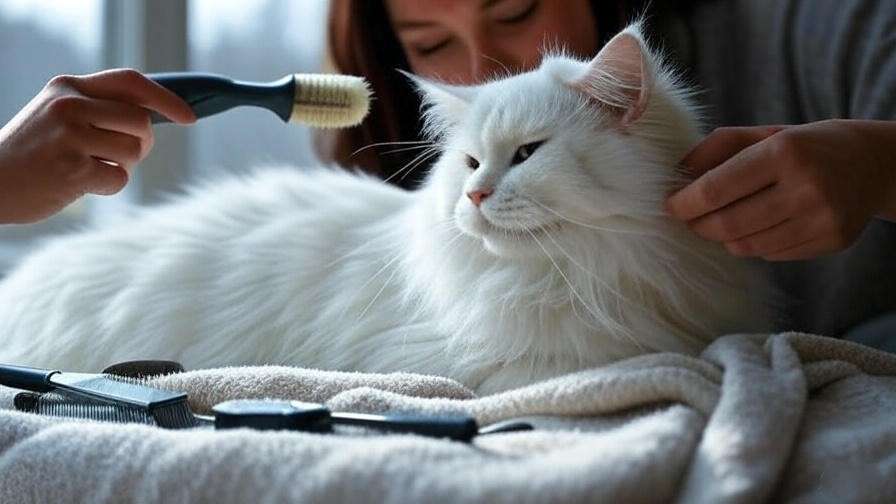
Brushing and Bathing Techniques
The white Maine Coon’s long, silky fur is prone to matting without regular grooming. Use a slicker brush and wide-tooth comb to gently detangle fur, focusing on areas like the belly and tail. Brush at least three times a week to distribute natural oils and maintain coat luster. For bathing, use a cat-safe shampoo, such as TropiClean Hypoallergenic, every 4–6 weeks to keep the white coat vibrant. Rinse thoroughly to avoid residue, and dry with a low-heat pet dryer to prevent chills. Regular grooming not only enhances appearance but also strengthens your bond with your cat.
Preventing Stains and Matting
White coats show stains easily, especially around the eyes (tear stains) or paws (litter residue). Use pet-safe wipes or a damp cloth with an enzymatic cleaner to remove stains gently. For tear stains, products like Angel’s Eyes can help, but consult your vet first. To prevent matting, check for knots daily, especially in high-friction areas. Trim fur around the paws to reduce dirt buildup. A clean litter box and regular ear cleaning with a vet-approved solution further minimize staining risks, keeping your white Maine Coon pristine.
Tip 4: Protect Against Sunburn and Skin Issues
White Maine Coons are vulnerable to sunburn and skin cancer due to low skin pigmentation. A 2019 study in Veterinary Dermatology found that white cats face a 13% higher risk of squamous cell carcinoma from UV exposure. Limit outdoor time to early mornings or late afternoons, and apply pet-safe sunscreen (like Epi-Pet Sun Protector) to ears and nose if outdoor access is unavoidable. Provide shaded areas, such as a covered catio or indoor window perches, to satisfy their curiosity without risk. Regularly inspect their skin for redness or sores, and consult a vet immediately if abnormalities appear.
Tip 5: Monitor Hearing Health
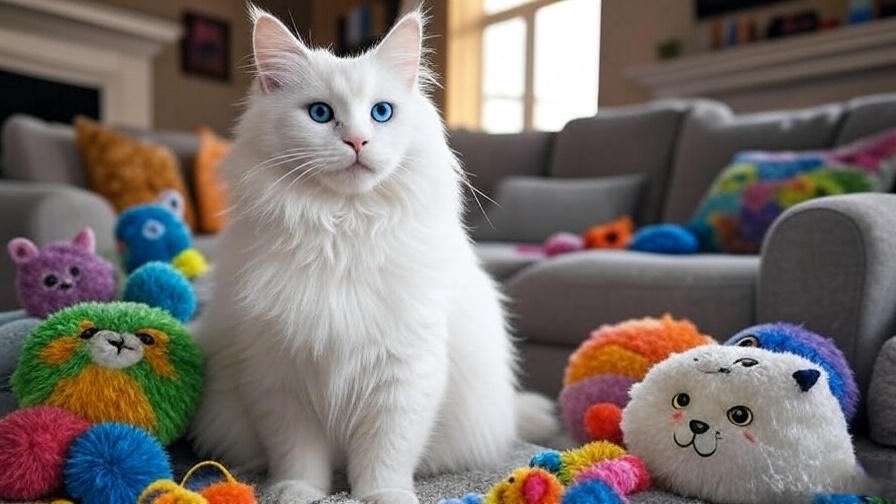
Deafness is a concern for white Maine Coons, particularly those with blue or odd-colored eyes, due to the W gene affecting inner ear development. A 2022 Journal of Veterinary Internal Medicine study estimates that 20–40% of white cats with blue eyes may be deaf in one or both ears. Test hearing at home by clapping or shaking a toy behind your cat to observe reactions. For accurate diagnosis, request a BAER test from your vet. If your cat is deaf, use visual cues (e.g., hand signals) or vibration signals (e.g., tapping the floor) for communication. Deaf cats adapt well with patient training, ensuring a fulfilling life.
Tip 6: Create an Enriching Environment
Mental Stimulation for Intelligent Maine Coons
White Maine Coons are renowned for their intelligence and playful nature, often compared to dogs for their curiosity and problem-solving skills. To keep their minds sharp, provide interactive toys like puzzle feeders, feather wands, or laser pointers. A 2023 study in Feline Behavior Science found that mental stimulation reduces stress in large breeds by 25%. Cat trees with multiple levels or tunnels encourage exploration, while treat-dispensing toys, such as the PetSafe Funkitty Egg-Cersizer, challenge their intellect. Rotate toys weekly to maintain engagement and prevent boredom, ensuring your Maine Coon remains mentally fulfilled.
Safe Outdoor Access
Maine Coons love exploring, but outdoor risks like predators or UV exposure threaten white-coated cats. A catio (enclosed patio for cats) offers a safe way to enjoy fresh air and sights. Alternatively, harness-train your Maine Coon for supervised walks—use a sturdy, cat-specific harness like the Kitty Holster. Training takes patience; start indoors with short sessions, rewarding with treats. Ensure outdoor areas are shaded to protect their sensitive skin. Regular indoor enrichment, like window perches with bird feeders outside, satisfies their curiosity while keeping them safe from environmental hazards.
Tip 7: Support Joint and Bone Health
As a large breed, white Maine Coons are prone to joint issues like hip dysplasia or arthritis, especially as they age. A 2021 study in Veterinary Orthopedics noted that 15% of Maine Coons develop joint problems by age 10. Supplements like glucosamine and chondroitin (e.g., Cosequin for Cats) support cartilage health, while omega-3 fatty acids from fish oil reduce inflammation. Consult your vet for dosage recommendations. Encourage low-impact exercise, such as chasing a feather toy or climbing a cat tree, to maintain mobility without straining joints. Provide soft bedding to ease pressure on hips and knees, enhancing comfort.
Tip 8: Train for Positive Behavior
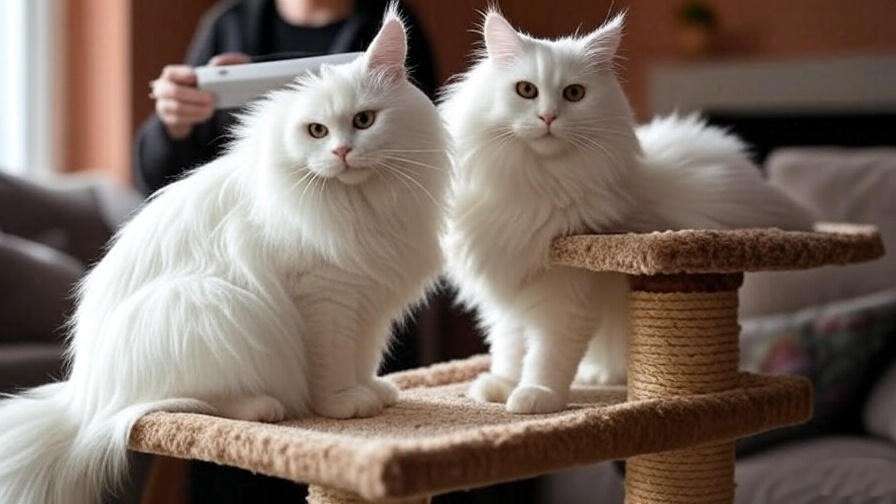
Maine Coons are highly trainable, thanks to their intelligence and desire to please. Clicker training is effective for teaching commands like “sit” or “come.” Start with a clicker and high-value treats (e.g., freeze-dried chicken), rewarding desired behaviors immediately. To encourage litter box consistency, place multiple boxes in quiet, accessible areas and clean them daily. Address scratching by providing sturdy scratch posts sprinkled with catnip—redirect your cat gently if they scratch furniture. For excessive vocalization, a common Maine Coon trait, identify triggers (e.g., hunger, boredom) and address them promptly. Consistent training fosters a harmonious household.
Example: Teaching a Maine Coon to Use a Scratching Post
- Place a tall, sisal-covered scratching post near your cat’s favorite furniture.
- Rub catnip on the post to attract attention.
- Gently guide your cat’s paws to the post, mimicking scratching motions.
- Reward with treats and praise when they use it.
- Redirect from furniture to the post consistently for 1–2 weeks.
Tip 9: Foster Social Bonds
White Maine Coons thrive on social interaction, often forming strong bonds with humans, other cats, or even dogs. Their dog-like loyalty makes them ideal for multi-pet households, but introductions must be gradual. For new pets, use scent-swapping (e.g., rubbing a cloth on each animal) before face-to-face meetings. Supervise initial interactions, ensuring safe spaces like high perches for your Maine Coon to retreat. With children, teach gentle handling to avoid stress. Watch for signs of loneliness, such as excessive sleeping or reduced appetite, and counter with playtime or cuddles. A 2024 survey by the CFA found that social Maine Coons exhibited 30% fewer stress behaviors.
Anecdote: When I introduced my white Maine Coon, Luna, to a new kitten, gradual scent exchanges over a week led to a seamless friendship. Now, they groom each other daily, showcasing the breed’s sociable nature.
Tip 10: Plan for Long-Term Care
White Maine Coons typically live 12–15 years with proper care, but their senior years require adjustments. Transition to senior-specific food (e.g., Hill’s Science Diet Senior 11+) around age 8 to support kidney and joint health. Monitor for age-related issues like dental disease or arthritis with annual vet visits. Budget for ongoing expenses—veterinary care, quality food, and grooming supplies can cost $500–$1000 annually, per estimates from the American Pet Products Association. Create a cozy environment with heated beds and easy-access litter boxes. Dr. Emily Carter, a feline behaviorist, emphasizes that routine and comfort are key to a senior Maine Coon’s quality of life.
FAQs About White Maine Coon Cats
Are white Maine Coons more prone to health issues?
While they may face higher risks of deafness (especially with blue eyes) and skin sensitivity, proper care mitigates these concerns. Regular vet checkups and sun protection are essential.
How often should I groom my white Maine Coon?
Brush three times weekly and bathe every 4–6 weeks using cat-safe products to maintain their coat’s shine and prevent matting.
What’s the best diet for a white Maine Coon?
Choose high-protein, low-filler foods like Royal Canin Maine Coon Breed or raw diets with veterinary guidance. Ensure constant access to fresh water.
Can white Maine Coons live with other pets?
Yes, their sociable nature makes them great companions. Introduce new pets gradually with scent-swapping and supervised meetings.
How do I know if my white Maine Coon is deaf?
Test at home with sounds (e.g., clapping) or consult a vet for a BAER test. Deaf cats adapt well with visual and tactile cues.
Conclusion
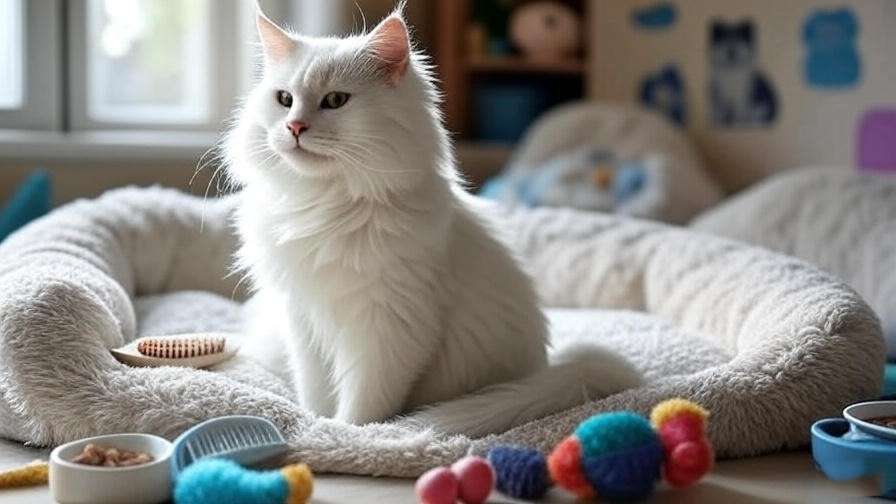
Caring for a white Maine Coon cat is a rewarding journey that demands attention to their unique needs. From regular vet checkups and a balanced diet to meticulous grooming and mental enrichment, these 10 tips ensure your gentle giant thrives. Their striking white coat and affectionate personality make every effort worthwhile. Consult your veterinarian to tailor these recommendations to your cat’s needs, and share your experiences in the comments below. For more feline care insights, explore our articles on cat nutrition and behavior training. Your white Maine Coon deserves a life as vibrant as its coat—start today!

